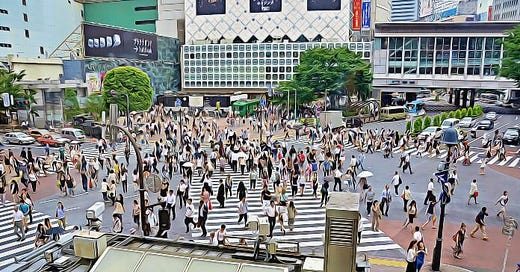3 Ideas in 2 Minutes on Thinking Critically About Data
Apophenia, the Truck Problem & Overcoming Overabundance
I. Apophenia
Apophenia is a term for the human tendency to see patterns where none exist. The data we look at may be random. But we still try to find connections to make sense of them. Alan Watts has talked about this phenomenon from a philosophical perspective:
Now it’s amazing what doesn’t exist in the real world. For example, in the real world there aren’t any things, nor are there any events. That doesn’t mean to say that the real world is a perfectly featureless blank.
It means that it is a marvelous system of wiggles, in which we describe things and events in the same way as we would project images on a Rorschach plot. Or pick out particular groups of stars in the sky and call them constellations as if they were separate groups of stars.
Well, they’re groups of stars in the minds’ eye, in our system of concepts. They are not out there as constellations already grouped in the sky.
—Alan Watts
The term was coined by German psychiatrist Klaus Conrad while studying the early stages of schizophrenia.
Sometimes, ignoring parts of the information can lead to better results. I wrote about this phenomenon in a post about 5 Useful Heuristics for Quick Decision-Making in Daily Situations.
II. The Truck Problem
Apophenia goes to show that more data isn’t always useful. Here’s the inimitable Nassim Nicholas Taleb sharing a life-saving use case for ignoring irrelevant information.
More data — such as paying attention to the eye colors of the people around when crossing the street — can make you miss the big truck.
—Nassim Nicholas Taleb, Antifragile
III. Overcoming Overabundance
The solution to overcoming an overabundance of information is fairly simple. Former analyst and lecturer Charles Vandepeer gives away the open secret:
In dealing with an overabundance of information, having a specific question in mind is important if we are to make any sense of the information. Without a specific question or problem in mind, we have no frame of reference to identify what is and is not relevant. With a specific problem or question, analysts can at least look at the information and determine what we can know, what judgements we can make and identify the gaps in knowledge.
—Charles Vandepeer, Applied Thinking for Intelligence Analysts
🐘
Have a great week,
Chris
themindcollection.com




